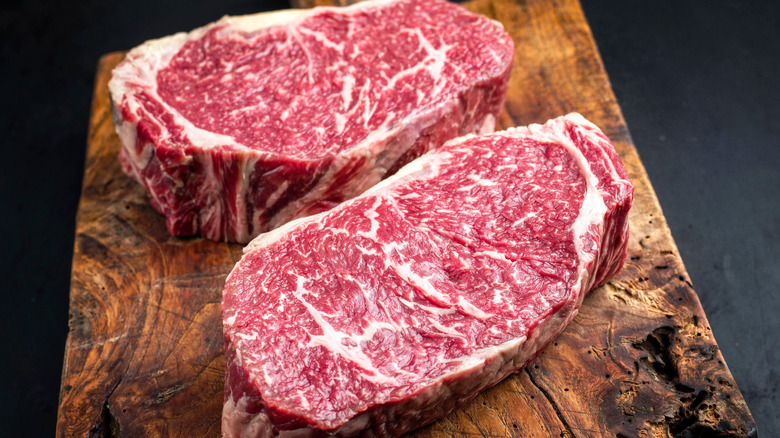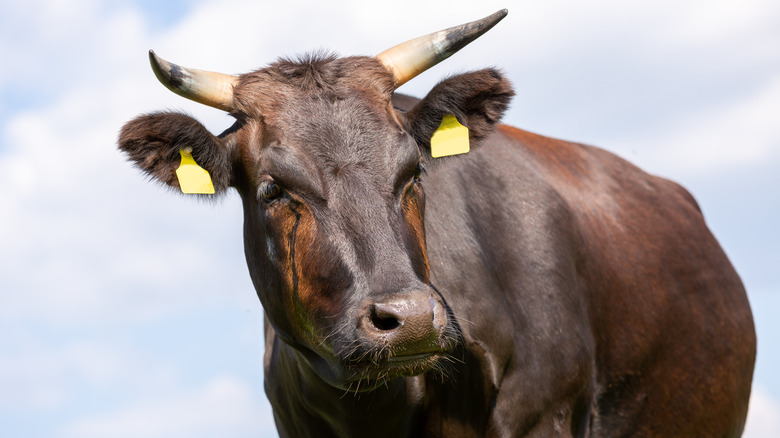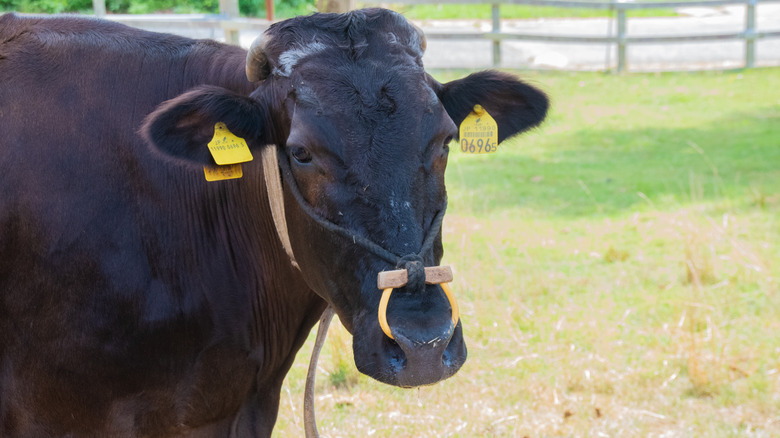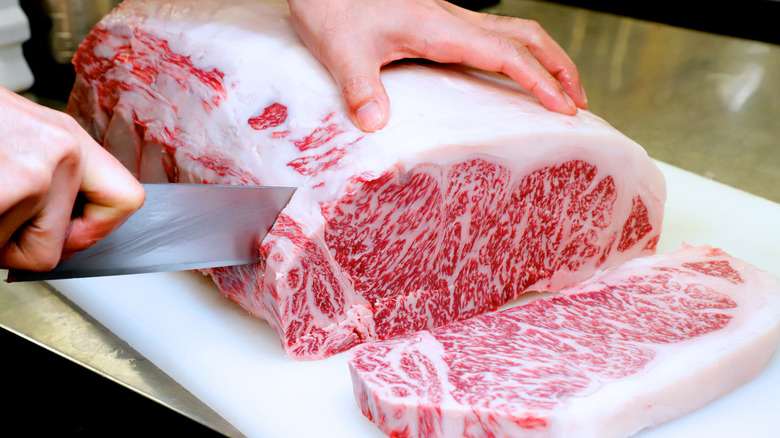Wagyu Vs Kobe Beef: What's The Biggest Difference?
You can't simply order a steak anymore. There's more to it than just rare or medium-rare. It's not uncommon for great steakhouses to list not just the cuts of steak — ribeye, cowboy ribeye, or porterhouse, for example – but to also specify each steak's provenance, including what kind of cow the steak comes from, where it was raised, and what those cows dined upon in their journey from farm to table.
All this detailed information is great, but it means consumers require some education before choosing their dinner. Two of the most misunderstood categories of steak are Wagyu and Kobe. Is there a difference? Is Wagyu just American Kobe? Like most interesting food topics, the distinction between Wagyu and Kobe requires a little linguistic understanding, a little geography, and an appreciation for the subtle distinctions of extraordinary beef. Especially when you're paying exorbitant prices for steakhouse cuisine, it's important to understand what you're getting.
What is Wagyu?
According to the American Wagyu Association, "Wagyu" is a Japanese term combining "wa," meaning Japanese, and "gyu," meaning cow, so actually refers to any Japanese cattle. Wagyu International explains cattle in Japan were originally raised as working animals, rather than as food sources. It wasn't until the 1950s and the decline of the need for working cattle, that breeding practices widely shifted from selecting the biggest, strongest animals to those that yielded the best quality beef. The most significant improvements in beef quality have occurred in the last 30 years (via Wagyu International).
In Japan, there are four breeds considered Wagyu, according to Wagyuman: Japanese Black, Japanese Brown (called Red Wagyu in the United States), Japanese Shorthorn, and Japanese Polled. The Cattle Site explains that Wagyu cattle were first imported into the United States in 1976, beginning with just four bulls: two Tottori Black Wagyu and two Kumamoto Red Wagyu. Wagyu International traces the breeding of these four original bulls, as well as other Japanese imports (fewer than 200 in total) in the 1990s. Since then, Japan has prohibited not only the export of Wagyu cattle, but the export of live Wagyu, semen, and embryos as well, according to Nikkei Asia. Currently, there are roughly 40,000 Wagyu cattle in the United States, most of which have been crossbred with other breeds of cattle.
What is Kobe?
If Wagyu refers to all Japanese cattle, then you're probably wondering what Kobe beef is. In fact, Kobe beef is a registered trademark, and that's just where the regulation begins. In order to be considered Kobe, the meat must be from a black Tajima Wagyu steer or heifer, raised and processed in Hyogo Prefecture in Japan, according to specifications established and enforced by the Kobe Beef Marketing and Distribution Promotion Association. Exceedingly strict standards for fat content and marbling are applied for Tajima beef to be considered Kobe. Not only is Kobe highly regulated, but consumers can even obtain a ten-digit ID number so they can "easily trace the pedigree information and production history of your ordered beef."
Kobe must be produced in Japan, and although it can be found elsewhere, that hasn't always been the case, according to Crowd Cow, a purveyor of fine meats. Japanese exports of Kobe are, as you might imagine, meticulously tracked, and the marketing association maintains a database of every piece of its precious beef that's exported, including the individual ID number, the country importing it, the weight of the beef, and the date of the shipment. All of this makes Kobe beef one of the rarest dishes you can try, with a limited number of U.S. restaurants serving certified cuts of the meat. Oh, and prepare yourself for sticker shock. Crowd Cow's Kobe filets sell for upwards of $400 per pound – when they have it in stock.
So what's the biggest difference between Wagyu and Kobe?
Ultimately, all Kobe is Wagyu, but not all Wagyu is Kobe. While Wagyu could refer to an American-born Japanese cow, the term Kobe is specific to cattle from Hyogo that adheres to strict specifications. Think of it like Champagne, which is a type of sparkling wine that must be grown in a specific region of France and produced in a particular way (per Asian Inspirations).
Forbes chronicled the evolution of the availability and quality of Kobe and American Wagyu, and contends that the biggest difference is that organizations like the American Wagyu Association "can only encourage our members to market their beef products with confidence and truth in labeling that the consumer deserves." Products labeled "Domestic Wagyu" or "Wagyu" may not be of the same quality as Kobe, therefore. Remember, American Wagyu cattle have been crossbred with other varieties, meaning they may not produce beef that's of as high a caliber as their Japanese counterparts. The quality level, which may vary, is determined by the producer, and isn't necessarily guaranteed.
Still, both Waygu and Kobe beef are prized for their high-fat content and dense marbling (via My Chicago Steak), which can yield a sublime experience for those fortunate enough to experience it. Both also carry steep price tags but would be a rare treat for most of us.



